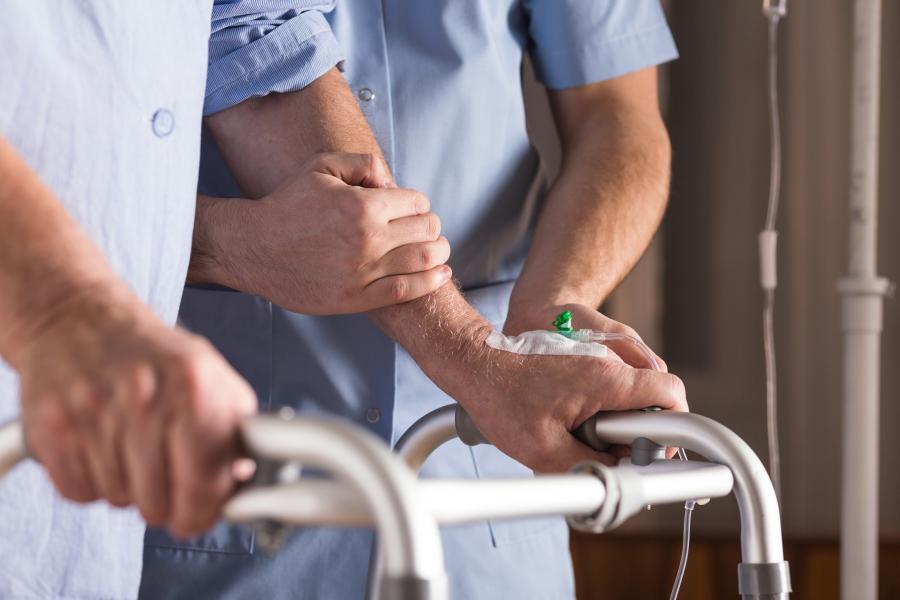About This Course
This course is approved by the NMC. An MSc Adult Nursing is also available.
The MSc in Mental Health Nursing leads to registration with the Nursing and Midwifery Council and offers graduates a funded route over two-years into mental health nursing whilst simultaneously obtaining a postgraduate qualification. This postgraduate qualification is aimed at graduates who wish to develop and apply the knowledge gained through their undergraduate degree and relevant life experiences to pursue a career in mental health nursing. The aim of this course is to prepare a registered nurse who is able to offer excellent and compassionate care, enhanced leadership, management, and strong inter-professional and research skills that influence practice and initiate change.
Our exceptional teaching provision based upon contemporary research, (a key focus of the schools highly ranked research activity), is grounded in modern mental health practice. The Mental Health Nursing MSc will equip graduates to develop and thrive in rapidly changing environments, taking into account how early trauma and adversity, culture, socioeconomic influences, stigma and other factors can impact resilience, function, health status and mental health outcomes. The programme will equip students with engagement and assessment skills necessary for planning and delivery of compassionate high-quality care and manage complex practice across the lifespan.
Students will graduate from this programme as creative and skilled mental health nurses in a position to apply to part one of the NMC register. The successful graduate will have the necessary values, knowledge and skills to practice to the highest standards of safe, compassionate care in mental health services.
Tuition Fees Covered
If you are considered a home UK student for tuition fees who can commit to working in Wales for two years after graduating, you could get your tuition fees covered in full through the NHS Wales Bursary Scheme and claim for a £1,000 bursary contribution towards living costs. You can also apply for the means tested bursary that is dependent on household income and other funding that has eligibility criteria for child care support, dependents allowance and parental learner allowance. If you would prefer not to work in Wales following your graduation you can apply for the master’s student loan funding for your fees and a reduced maintenance grant.
As this course is funded by NHS Wales we are unable to accept applications from overseas students.
Full details are available on our NHS funding page.
Why Choose Bangor University for this Course?
Visit our Why Study with us? page to find out some key facts about why you should choose Bangor for this course
Course Content
What will you study on this course?
Throughout the programme, practice placements in acute, community, and specialist mental health services in North West Wales are designed to provide a range of experiences. You will have compulsory theoretical study in addition to clinical placements, all aimed at equipping you for practice. During placements, you will be supernumerary, allowing you to work alongside your practice supervisors and assessors as you participate in the delivery of nursing care.
Support is available from a personal tutor, who is a registered nurse and an academic member of staff, as well as from practicing registered nurses and other professionals during placements. Theoretical and practical work will be assessed through assignments, examinations, presentations, and the Once for Wales Practice Assessment Document and On-going Record of Achievement.
Course Structure
Year 1
- Engagement and Assessment in Mental Health
- Legal & Ethical Concepts
- Planning and Delivering Humanised Care in Mental Health
- Physiology & Pathophysiology
- Nursing Practice 1
Year 2
- Managing Risk and Complexity in Mental Health
- Lead, Innovate and Implement
- Evidence for Practice Dissertation Module
- Nursing Practice
Teaching, Learning and Assessment
The teaching and learning strategy for the course will take a student-centred approach, building on the graduate skills developed during your first degree. While there will be some taught lectures for each module, the main emphasis will be on group work to develop your knowledge, clinical decision-making skills, and problem-solving abilities in real-life scenarios.
How will you study?
The course is 50% theory and 50% practice placement learning, comprising 22 weeks of theory teaching and 22 weeks of practice placement learning. It is delivered through a blend of in-person theory teaching and online tutorials and seminars. You will attend facilitated sessions to develop the clinical skills required to meet the NMC Future Nurse Standards 2018, preparing you for your practice learning.
Your practice learning will take place in various clinical settings across North West Wales, in both primary and secondary care, to provide a range of acute and community placement learning opportunities. You will be supported by a practice supervisor and a practice assessor in clinical practice, as well as an academic assessor, to ensure you are progressing and achieving the proficiencies required for registration with the NMC.
Entry Requirements
Please note this course is not available for International Students.
Applicants will normally have achieved a minimum 2.2 honours degree in a health / life or social science related subject, within the last 5 years. Applicants must also be able to demonstrate undertaken 700 hours of healthcare related experience which can be mapped to the NMC progression point one core competencies.
GCSE requirements: In addition to the attainment of a suitable degree, the NMC requires that all applicants must demonstrate evidence of communication and numeracy, and these must be demonstrated via GCSE grade C/4 or above in Mathematics and English or Welsh first-language or a recognised alternative.
‘Good Health and Good Character’: The NMC also require that evidence of ‘Good Health and Good Character’ be obtained, and in addition to the supportive reference to the application, the School has adopted the All Wales Good Character reference. Good Character is further assessed by way of a Full/Enhanced DBS report, and these are risk assessed by the partnership in accordance with the School’s policy. Good Health is assessed by the local Health Board’s Health at Work Unit, and students are monitored throughout the programme and supported where required.
Selection processes
- Submission of application. Only applications submitted through our Direct Application portal will be considered.
- Short listing.
- Candidates who are successfully shortlisted will be invited to interview.
- Formal interview with interactive group work activities
- Numeracy / medication calculation
- Written essay on seen question – confidentiality and data protection.
- Enhanced DBS disclosure check.
- Occupational health review.
- If successful at interview applicants will be invited to progress to part two and complete and submit their RPL/REPL portfolio. As admission to the programme requires a time frame to allow for the completion of the RP(E)L process, early applications are encouraged. Further details on this process can be obtained following interview.
Selection events and processes will involve lecturers in Mental Health nursing, Health Board clinical staff, service user participants. Participants in the selection processes undergo training and support in diversity and equality as part of their professional development.
Evidence of achievement / Reflective Portfolio
Applicants will be required to complete an RP(E)L reflective portfolio that demonstrates achievement of the Year 1 progression points outlined in the Nursing and Midwifery Council (NMC) Standards for Pre-registration Nursing Education (NMC, 2018). As part of this portfolio, applicants must submit their BSc/BA certificate and a transcript of the modules completed during their degree.
The reflective portfolio should include specific examples and evidence showing how the applicant's healthcare experience demonstrates attainment of the required progression points. This evidence may include examples from practice experiences, study days attended, mandatory training, and references provided by employers. Applicants must also submit a Declaration of Own Work, confirming they have exclusively completed the PRL/RPEL portfolio.
The portfolio will be assessed using the following criteria:
- Authenticity: Does the evidence unmistakably support full achievement of the Year 1 NMC progression criteria?
- Legitimacy: Is the achievement sufficient to meet the required standards for Year 1, as specified by the NMC 2018 Standards?
- Time Frame: Are the claims based on experiences relevant to the current healthcare setting, i.e., within the last 3 years?
- Sufficiency: Is the evidence sufficient to fully demonstrate attainment of the claimed learning and experiences?
- Graduate Skills: Has the applicant demonstrated the expected level of study skills for entry at Level 7?
The portfolio will be reviewed by an academic staff member and assessed as a pass or fail. Where necessary, guidance and support will be provided by staff in the Academic School to assist in completing this requirement.
Further Important Information
- Dyslexia / Disability: Applicants with particular needs in relation to dyslexia or a disability are encouraged to declare this on the front cover of their RPL/REPL portfolio so that this can be considered when reviewing the evidence.
- There are a set number of funded places on this programme are (funding criteria and further information is available on the HEIW website).
- Students who accept a funded place for this course will be required to work within Wales for two years following graduation from the programme.
- Students with disabilities, on application, are supported by the University’s Disabilities Officer and the School’s Disabilities Advisor, and relevant risk assessments undertaken and adaptations where required, explored.
- Where there may be issues relating to Good Character, Good Health, or Disability that require further exploration or investigation, the School and the local Health Board’s Fitness for Practice Committee would be consulted.
- As this is a funded programme by the Health Education and Improvement Wales (HEIW) international students will not be able to apply for this programme of study.
Careers
Students successfully completing the MSc Mental Health Nursing are able to register their professional status with the Nursing and Midwifery Council and seek employment as a registered nurse through the HEIW streamlining processes.
Employability rates are high in comparison to other graduates, given the professional competence and qualification in association with a degree. Career opportunities once employed as registered nurse are excellent and can lead to promotion opportunities in clinical practice/specialism, research or education.
Careers Advice
Careers advice is gained from healthcare professionals both in practice and in dedicated careers sessions and NHS Careers has more details of the career opportunities that are available.. You are also eligible to register for the Bangor Employability Award to further enhance career prospects and advice is also available from the Bangor University Careers & Employability Service.



